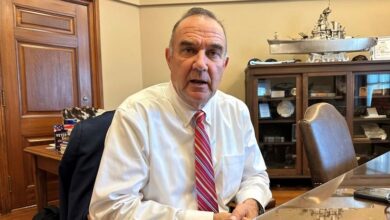Trump order a blow to wind-energy industry; Orsted sees setbacks on Sunrise Wind

The Trump administration has delivered a potential body blow to the wind-energy industry with a sweeping executive order that pauses new leases and permits for arrays in federal waters and on land.
The move comes as Orsted, the Denmark-based developer of Sunrise Wind, detailed a series of setbacks for the Long Island project which will push back its completion date by a year to mid-2027.
Trump’s order Monday night could have an immediate impact on future projects planned for the waters between New York and New Jersey, for which leases have already been issued but which will need federal permits to move forward. New York State, which canceled then reissued a solicitation for projects last year in the area known as the New York Bight, was expected to announce new awards as soon as this month. One project, Attentive Energy, has already pulled out, citing uncertainty tied to Trump’s election.
“Changes at the federal level will create new challenges for the state and for programs New Yorkers care about. It’s already started,” Gov. Kathy Hochul said in a speech announcing her state budget Tuesday. “We must be prepared to meet the challenge of the federal government walking back commitments to offshore wind — a key energy source — in our transition to renewables.”
Trump’s executive order, which temporarily forecloses the prospect of any new lease awards for wind energy in the outer continental shelf, cited “various legal deficiencies” and potential “grave harm” to shipping and fishing interests. It prevents any federal agency from issuing “new or renewed approvals, rights of way, permits, leases or loans” for offshore wind projects, pending a “comprehensive assessment.”
Trump’s assessment will “consider the environmental impact of onshore and offshore wind projects upon wildlife,” including marine mammals and birds, while considering the costs tied to the “intermittent” nature of wind energy and the “effect of subsidies on the viability of the wind industry.” Existing U.S. rules allow wind developers to receive tax credits valued at one third to half the cost of the projects.
The New York State Energy Research and Development Authority, which oversees offshore wind contracts, said it was “carefully reviewing” the Trump order, but called it “too soon” to determine what “if any” impact it will have on New York projects.
Whether projects that already have their federal permits could be impacted is uncertain. Orsted, which is building the land-based cable for Sunrise Wind in Brookhaven Town, said on Tuesday that it was taking another large impairment charge, this time nearly $1.7 billion, tied in part to delays and cost overruns on Sunrise Wind and other U.S. projects. The company cited “considerably increased project costs” tied to the monopile foundations for the turbines but said it still expects the project to be profitable when completed by mid 2027 — a year behind the prior schedule.
Land-based construction for Sunrise Wind has been heightened near Smith Point, where a high-voltage cable will make land. Crews were seen at two newly built dock facilities at the Suffolk County Park.
In a statement announcing the delays, Orsted chief executive Mads Nipper called the new impairments (on top more than $4 billion last year) and the delays “very disappointing,” but said the company remains “committed to the U.S. market in the long term …”
Nipper said Orsted was “working diligently and in close collaboration with our suppliers to manage the remaining risks impacting the construction of Sunrise Wind.” Completing construction by the new delivery date and on budget, he said, is a “top priority.”
Norway-based Equinor is at work on Empire Wind 1, a project 14 miles off the coast of Long Island, with all needed federal permits in hand. About 60 Long Beach residents held a protest Saturday in opposition to the project.
“We will continue to assess all policy developments and work with the Trump administration as we deliver long-term energy solutions for the growing American economy,” an Equinor spokesman said in an email.
Source link




